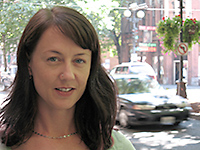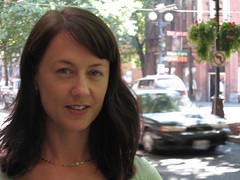Martin King writes: Hugh’s post “Mortality” gave me serious pause. For a short time I changed the WordPress state of this post to “private” – but then we restored it.
One of the guidelines we established in deciding to blog about Exbiblio was that we must reserve the privacy of exbiblio’s employees (of which I am one). There’s nothing actually wrong with Hugh’s post, no major inaccuracies – I just felt it was way too personal. But (of course) this turns out to be my fault, not Hugh’s. Here is the background:
Until very recently Exbiblio’s website described me as a “wacky inventor.”
So one of my “wacky” ideas was that we should write a book about Exbiblio, which book (as was suggested by several people) would employ Exbiblio’s technology – i.e., would be the first truly
interactive paper document, have numerous markup layers of comments, personal experiences, photos, etc. for each of Exbiblio’s employees (including me), etc. This imagined book would tell the story of our radical, values-first company – and might come bundled with one of the oPen scanners we are building. This imagined book would also essentially tell the the story of itself being written, maybe with a last chapter describing us shipping off the paper manuscript plus a scanner to various publishers…
Wacky, but by no means too wacky for me. And, a bit to my surprise, others at Exbiblio also thought this book idea was at least worth exploring. So on a Sunday afternoon last May I posted this to the Seattle Craigslist:
——–
Experienced and Accomplished Author Near Seattle
Reply to: job-160751628@craigslist.org
Date: 2006-05-14, 1:48PM PDT
Experienced and accomplished author near Seattle with technical depth – to write a sequel to Kidder’s “Soul of a New Machine” – but where the context and story are far, far more interesting.
This book will be about a truly extraordinary Seattle technology start-up company with a grand vision of the future – and it will be about (and written in collaboration with) the remarkable group of people who are pursuing this vision.
…
——-
And I also reached out directly to several established authors – including Hugh’s business partner Matthew Lynn (at the time I was reading Matthew’s “Birds of Prey” – which is wonderfully written). This is how we eventually get to Hugh (in London) blogging about Exbiblio (in Seattle).
A few weeks ago, at Exbiblio’s invitation, Hugh came to Seattle to see what we were doing and to discuss a possible book. But shortly after he arrived I steered our discussions and efforts to blogging for the company – not least because I wasn’t at all sure I was going to be willing to give up my treasured (and much defended and long preserved) privacy if we ever did decide to do a book.
So Exbiblio engaged Hugh to help with our blog – but Hugh and I also continued to discuss the potential to do a book, and the material it might contain. Indeed, as Hugh and I were sitting in Seattle’s fabulous SeaTac International Airport, with two hours before his return flight to London, I brought our conversation back to this maybe, sometime, probably-never-happen book. Or I thought I did anyway. Hugh thought we were still discussing the Blog.
So I am telling Hugh some of the background behind Exbiblio, my motivations, and a bunch of personal stuff – thinking this is possible material for the book, should we in fact ever decide to do a book.
And Hugh, who is thinking blog, keeps saying things like, “You know, everything you say will look different in print…” and, “You really won’t have a problem if these things are published?”
A few weeks later (as in last night) key parts of this conversation showed up on our blog. Hugh was sound asleep eight time zones away (unfortunately, not exactly “Near Seattle”). So I took his post off the site for 12 hours (hey, it was about me) until I could reach Hugh to discuss it. At which point we discovered some slight differences in how we understood our conversation at the airport. And I realized his post was here to stay.



